136 scholarly books by Dartmouth College Press and 9
have author last names that start with K
136 scholarly books by Dartmouth College Press and 9
136 scholarly books by Dartmouth College Press
9 have author last names that start with K have author last names that start with K
9 have author last names that start with K have author last names that start with K

Against Immediacy
Video Art and Media Populism
William Kaizen
Dartmouth College Press, 2016
Against Immediacy is a history of early video art considered in relation to television in the United States during the 1960s and 1970s. It examines how artists questioned the ways in which “the people” were ideologically figured by the commercial mass media. During this time, artists and organizations including Nam June Paik, Juan Downey, and the Women’s Video News Service challenged the existing limits of the one-to-many model of televisual broadcasting while simultaneously constructing more democratic, bottom-up models in which the people mediated themselves. Operating at the intersection between art history and media studies, Against Immediacy connects early video art and the rise of the media screen in gallery-based art to discussions about participation and the activation of the spectator in art and electronic media, moving from video art as an early form of democratic media practice to its canonization as a form of high art.
[more]
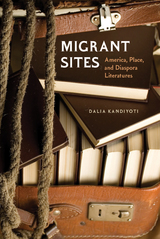
Migrant Sites
America, Place, and Diaspora Literatures
Dalia Kandiyoti
Dartmouth College Press, 2009
In Migrant Sites, Dalia Kandiyoti presents a compelling corrective to the traditional immigrant and melting pot story. This original and wide-ranging study embraces Jewish, European, and Chicana/o and Puerto Rican literatures of migration and diasporization through the literary works of Abraham Cahan, Willa Cather, Estela Portillo Trambley, Sandra Cisneros, Piri Thomas, and Ernesto Quiñonez. The author offers a transformed understanding of the ways in which the sense of place shapes migration imaginaries in U.S. writing. Place is a crucial category, one that along with race, class, and gender, has a profound impact in shaping migration and diaspora identities and storytelling. Migrant Sites highlights enclosure as a prominent sense of place and translocality as its counterpart in diaspora experiences created in fiction. Repositioning national literature as diaspora literature, the author shows that migrant legacies such as colonialism, empire, borders, containment, and enclosure are part of the American story and constitute the “diaspora sense of place.”
[more]

Human
Voices of Tomorrow’s Doctors
Tolu Kehinde
Dartmouth College Press, 2019
Medical professionals are often viewed as a special breed of stoic figures whose tough grace allows them to stay strong as they confront human frailty and tragedy on a daily basis. Human is a new anthology that aims to dispel this unhelpful line of thought, revealing a more realistic picture of individuals shaped by forces—good and bad—just like the rest of us. Collecting writing from medical students around the world, Human aims to demystify medical education by showing the vulnerability in a group typically viewed as indestructible. It also seeks to remind medical trainees that, even though it may feel like their lives have been put on hold for the sake of their education, they are continually growing and evolving, and as worthy of love and a full life as anyone else—in short, that they are human.
[more]
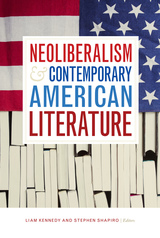
Neoliberalism and Contemporary American Literature
Liam Kennedy
Dartmouth College Press, 2019
Please Does it make sense to speak of an “American” literature in neoliberal times? Can literature function as either a neutral category or a privileged narrative of national imagination in a time when paradigms of the nation-state and of liberal capitalism are undergoing a prolonged shift? In the United States, as elsewhere, the association between the nation-state, liberal capitalism, and literary form has a long history, reflecting determinate relations between writer and reader within an imagined national community. As this community loses its symbolic efficiency in the age of neoliberal capital, the boundaries and possibilities of literary production and representation shift.
This collection of essays examines how American literature both models and interrogates the neoliberal present. Has literary realism been exhausted as a narrative form? Can contemporary literature still imagine either the end of capitalism or an alternative to it?fill in marketing copy
[more]
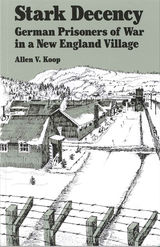
Stark Decency
German Prisoners of War in a New England Village
Allen V. Koop
Dartmouth College Press, 1988
Stark Decency is a window into the events of two vastly different worlds: German combat veterans captured in North Africa and Normandy, and the small New Hampshire logging town which found itself hosting the prison camp. Each side was forced to confront its prejudices and fears, and examine the merits and flaws of its ideology. Then, an astonishing thing happened: in their rural isolation, sharing harsh weather conditions and the pinch of wartime rationing, friendships began to develop. Prisoners and their guards sometimes even worked together to meet the daily pulpwood quotas, and little handmade gifts to the local villagers cemented friendships that continue to this day.
[more]

Building Partnerships in the Americas
A Guide for Global Health Workers
Margo J. Krasnoff
Dartmouth College Press, 2013
Students and health practitioners traveling abroad seek insightful, culturally relevant background material to orient them to the environment in which they will be living and working. No single book currently provides this contextual background and global health perspective. These essays emphasize building partnerships and were written by United States medical and dental professionals, in collaboration with social scientists and Latin American medical personnel. The authors provide the historical, political, and cultural background for contemporary health care challenges, especially related to poverty. Combining personal insights with broader discussion of country contexts, this volume serves as an essential guide for anyone—from medical professionals to undergraduate students—heading to Mexico, Central America, or the Caribbean to do health care–related work.
[more]
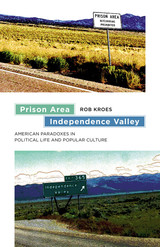
Prison Area, Independence Valley
American Paradoxes in Political Life and Popular Culture
Rob Kroes
Dartmouth College Press, 2015
The study of prisons brought Tocqueville to America. For Rob Kroes, one of Europe’s most distinguished authorities on contemporary American culture, it was rather the other way around. For Kroes, it was deep knowledge of American culture that brought him back to America and face to face with a couple of highway signs, Tocquevillian in their portent, that invited motorists to exit from Interstate 80 in Nevada toward a place called Independence Valley and to keep their eyes open for a “Prison Area.” In this collection of essays, Kroes invites us to take these two signs seriously for their capacity to deepen our insights into America’s cultural contradictions, especially how, after the September 11, 2001, attacks on the World Trade Center and Pentagon, the US government’s response altered the meaning of America for Americans and Europeans alike. The author’s fascination with the myriad ways in which America changes face, from hard power to soft, from uses of force to the power of entertainment, but always holding the attention of publics across the globe, is what ties his work together. The essays here touch on diverse topics such as photography (“Falling Man” and Holocaust imagery), music (in Broadway and Hollywood musicals), film (Django Unchained), American exceptionalism (in an interesting counter to dog-eared dogma), and the difficulties of the first “white president of color.” Like his predecessors, Tocqueville and Johan Huizinga, Kroes offers a clear-eyed assessment of America on the ground, love it or hate it. This readable and sharp-penned critique of America and American culture and power will appeal to Americanists across a broad swath of disciplines.
[more]
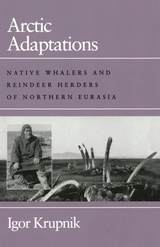
Arctic Adaptations
Native Whalers and Reindeer Herders of Northern Eurasia
Igor Krupnik
Dartmouth College Press, 2002
The common view of indigenous Arctic cultures, even among scholarly observers, has long been one of communities continually in ecological harmony with their natural environment. In Arctic Adaptations, Igor Krupnik dismisses the textbook notion of traditional societies as static. Using information from years of field research, interviews with native Siberians, and archaeological site visits, Krupnik demonstrates that these societies are characterized not by stability but by dynamism and significant evolutionary breaks. Their apparent state of ecological harmony is, in fact, a conscious survival strategy resulting from "a prolonged and therefore successful process of human adaptation in one of the most extreme inhabited environments in the world." As their physical and cultural environment has changed—fluctuating reindeer and caribou herds, unpredictable weather patterns, introduction of firearms and better seacraft—Arctic communities have adapted by developing distinctive subsistence practices, social structures, and ethics regarding utilization of natural resources. Krupnik's pioneering work represents a dynamic marriage of ethnography and ecology, and makes accessible to Western scholars crucial findings and archival data previously unavailable because of political and language barriers.
[more]
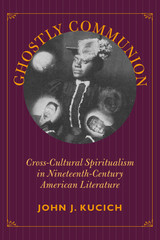
Ghostly Communion
Cross-Cultural Spiritualism in Nineteenth-Century American Literature
John J. Kucich
Dartmouth College Press, 2015
In this exceptional book, Kucich reveals through his readings of literary and historical accounts that spiritualism helped shape the terms by which Native American, European, and African cultures interacted in America from the earliest days of contact through the present. Beginning his study with a provocative juxtaposition of the Pueblo Indian Revolt and the Salem Witchcraft trials of the seventeenth century, Kucich examin[e]s how both events forged “contact zones”— spaces of intense cultural conflict and negotiation—mediated by spiritualism. Kucich goes on to chronicle how a diverse group of writers used spiritualism to reshape a range of such contact zones. These include Rochester, New York, where Harriet Jacobs adapted the spirit rappings of the Fox Sisters and the abolitionist writings of Frederick Douglass as she crafted her own story of escape from slavery; mid-century periodicals from the Atlantic Monthly to the Cherokee Advocate to the Anglo-African Magazine; post-bellum representations of the afterlife by Elizabeth Stuart Phelps, Mark Twain and the Native Americans who developed the Ghost Dance; turn-of-the-century local color fiction by writers like Sarah Orne Jewett, Charles Chesnutt and Maria Cristina Mena; and the New England reformist circles traced in Henry James’s The Bostonians and Pauline Hopkins’s Of One Blood. Kucich’s conclusion looks briefly at New Age spiritualism, then considers the implications of a cross-cultural scholarship that draws on a variety of critical methodologies, from border and ethnic studies to feminism to post-colonialism and the public sphere. The implications of this study, which brings well-known, canonical writers and lesser-known writers into conversation with one another, are broadly relevant to the resurgent interest in religious studies and American cultural studies in general.
[more]
READERS
Browse our collection.
PUBLISHERS
See BiblioVault's publisher services.
STUDENT SERVICES
Files for college accessibility offices.
UChicago Accessibility Resources
home | accessibility | search | about | contact us
BiblioVault ® 2001 - 2024
The University of Chicago Press









